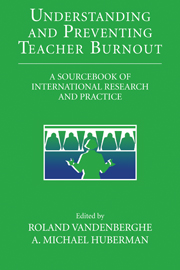Book contents
- Frontmatter
- Contents
- Contributors
- List of Figures
- List of Tables
- Foreword
- Introduction: Burnout and the Teaching Profession
- PART ONE TEACHER BURNOUT: A CRITICAL REVIEW AND SYNTHESIS
- PART TWO TEACHER BURNOUT: PERSPECTIVES AND REMEDIES
- PART THREE TEACHER BURNOUT: A RESEARCH AND INTERVENTION AGENDA
- References
- Index
Foreword
Published online by Cambridge University Press: 06 January 2010
- Frontmatter
- Contents
- Contributors
- List of Figures
- List of Tables
- Foreword
- Introduction: Burnout and the Teaching Profession
- PART ONE TEACHER BURNOUT: A CRITICAL REVIEW AND SYNTHESIS
- PART TWO TEACHER BURNOUT: PERSPECTIVES AND REMEDIES
- PART THREE TEACHER BURNOUT: A RESEARCH AND INTERVENTION AGENDA
- References
- Index
Summary
This volume is the fifth in a series sponsored by the Johann Jacobs Foundation. It is intended to build bridges between the scientific community and the practitioners in the field about an issue that has assumed growing importance – the burnout syndrome of teachers and its nefarious effects on their pupils. The quality of the relationship between teachers and pupils is indeed one of the most rewarding features of the teaching profession; it is potentially also the most vulnerable one, especially when viewed against the backdrop of an ever more rapidly changing world that compels both teachers and pupils to learn how to adapt. Because burnout in the teaching profession is a phenomenon that knows no national boundaries, the Johann Jacobs Foundation convened from November 2 to 4, 1995, an international conference with more than 40 scientists and young scholars at its Communication Center at Marbach Castle on Lake Constance in Germany. This book provides a well-balanced overview of the work of the conference, with a special and purposeful “confrontation” between North American and European perspectives. The various chapters in this text are drawn from papers and commentaries presented at the conference, reflecting the intensive and fruitful discussions that characterized the event. Moreover, the book also offers suggestions for future research and the development of useful interventions.
- Type
- Chapter
- Information
- Understanding and Preventing Teacher BurnoutA Sourcebook of International Research and Practice, pp. xv - xviPublisher: Cambridge University PressPrint publication year: 1999

